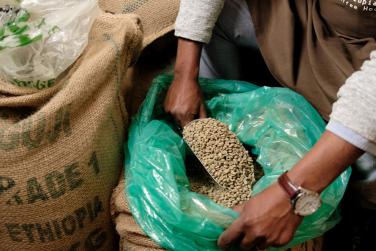Evaluation of the Digital Agricultural Advisory Services (DAAS) project in Ethiopia

Agriculture extension services—the application of scientific research and new knowledge to agricultural practices through farmer education—promote the adoption of improved farm technologies to increase productivity, a critical step for addressing increased food demand in the face of climate change. In recent years, Ethiopia has heavily invested in its agricultural extension system; nevertheless, this system faces some challenges that prevent it from realizing its intended goals.
The Digital Agricultural Advisory Services (DAAS) project, also known as the Farmstack project, is a five-year initiative supported by the Bill & Melinda Gates Foundation and the UK’s Foreign, Commonwealth, and Development Office (FCDO) that provides farmers in Ethiopia with relevant agricultural extension via digital channels while strengthening extension systems in-country. The program aims to increase farm income in the long-term for farmers in Amhara, Oromia, the Southern Nations, Nationalities, and People’s Region (SNNP), and Tigray.
DAAS has the potential to address four specific challenges that traditional agricultural extension services face:
- Constraints in the coordination between actors in the agricultural advisory services system;
- A lack of capacity to collect, maintain, and use program data to inform extension targeting and manage field worker performance;
- A shortage of quality content with associated time and location specificity; and
- Poor value chain linkages to ensure that production gains translate into positive outcomes for farmers.
In addition, because DAAS is demand-driven, it has the potential to address the specific extension needs of individual farmers, which may ultimately lead to better results at the farm level, including farm income and agricultural productivity.
Impact and Process Evaluations
The Gates Foundation and FCDO contracted AIR to conduct two impact and process evaluations of the DAAS program in the dairy and wheat sectors. These impact evaluations investigate the program’s effects on intermediate impacts, such as knowledge about and adoption of key practices as well as longer-term outcomes, such as agricultural productivity and income. To identify program impacts at the farm level, AIR is conducting an experimental design for each of the two targeted sectors in Oromia, Amhara, and SNNP.
The goal of the process evaluations is to investigate the program’s implementation fidelity, its alignment with the theory of change, and its ability to translate content into targeted messages. Additionally, the evaluation will generate evidence on how DAAS is able to contribute to women’s access to extension services in Ethiopia. Lastly, the evaluations also include a cost analysis to assess how the program’s cost compare to its benefits. Final results of the evaluation will be available in the second half of 2024.
